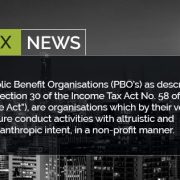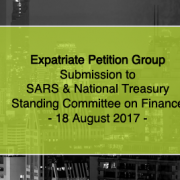SARS Binding Private Ruling 277
Date: 6 September 2017
Act: Income Tax Act 58 of 1962
Summary: This ruling determines the tax consequences for an employee share trust resulting from the vesting of “restricted equity instruments” held by its beneficiaries, and whether the trust is liable to withhold PAYE in respect of the vesting of the section 8C gain in the beneficiaries.
This binding private ruling is valid for a period of three years from 11 July 2017.
For access to the entire ruling please click here
![2025-logo-[Recovered] Tax Consulting South Africa](https://www.taxconsulting.co.za/wp-content/uploads/2025/01/2025-logo-Recovered.png)





